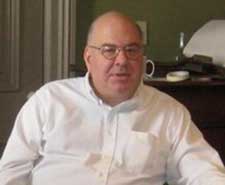In Memorium: William Pencak by George W. Boudreau

Photograph courtesy of Vincent Parker
- In Memorium: William Pencak by George W. Boudreau
- Remembering Bill Pencak by Joanne Freeman
- Memorial for Dr. Bill Pencak by Lindsey Keiter
In Memorium: William Pencak
This piece originally appeared on H-OIEAHC.
William Pencak, professor emeritus of history at Penn State University, distinguished historian of early American history, historian of Pennsylvania, and twice editor of Pennsylvania History, died Monday, December 9, 2013 in Atlanta, Georgia, of cardiac failure following heart surgery.
A native New Yorker, he received his B.A. from Columbia University in 1972, with an M.A. the following year and a Ph.D. in history in 1978. The years that followed included scholarly production on a phenomenal scale. His first books, War, Politics, and Revolution in Provincial Massachusetts (198l) and America’s Burke: The Mind of Thomas Hutchinson (1982), focused on New England, while his third, For God and Country: The American Legion, 1919–1941 (1989) explored a twentieth-century topic for a very special reason: he wrote the book that a friend had set out to do, prior to his untimely death.
The publications that followed would reveal the polymath mind that Bill Pencak possessed. His score of single-authored or edited volumes ranged from the intricacies of early American ethnicity, culture, and conflict to film studies, opera history, and semiotics. In the last decade, much of his intellectual passion focused on the history of early American religion. His Jews and Gentiles in Early America, 1654–1800 (2005) took him into the reconstruction of an oft-overlooked segment of colonial society, as well as giving him the chance to focus on his own heritage. The ideas he wrote of in that book led to new avenues to explore in the classroom. He taught classes in Jewish studies prior to his retirement from Penn State’s University Park campus, and following his retirement he accepted a position as Bert and Fanny Meisler Visiting Professor of History and Jewish Studies in the Department of History at the University of South Alabama. At the same time he wrote the chronological successor volume to Jews and Gentiles, he was also working on a biography of Bishop William White, Pennsylvania’s first Episcopal Bishop.
Bill Pencak’s passion for Pennsylvania history was a central focus of his career. He co-edited the massive Pennsylvania: A History of the Commonwealth as much to engage in a history that fascinated him as to have the chance to work with his friend Randall Miller and numerous other friends. Service to community and commonwealth were always at the center of his life. A decades-long stalwart of the Philadelphia and McNeil Center for Early American History’s Friday seminars and Zuckerman salons, he is remembered for his intense intellectual engagement of presenters as well as the sense of humor and love of good fellowship that he had there. Those characteristics combined ideally in the two periods in which he edited Pennsylvania History. He expanded its readership and scholarly focus during his first term as editor, including creating the annual Explorations in Early American Culture in partnership with the McNeil Center. In 1998, he honored me by inviting me to serve as his co-editor. Later, this work would lead to the creation of the new journal, Early American Studies, where he continued to serve as senior consulting editor until his death. While he took a few years off from journal editing to pursue other projects, he returned to helm Pennsylvania History a few years later. When news of Bill Pencak’s sudden death spread throughout the academic community, stunned colleagues around the country responded with a similar statement: Bill Pencak was the first major scholar who noticed their—our—work, and he was the one who helped craft rough prose into numerous first published articles.
It is hard to sum up the warmth, the kindness, the sense of humor, and other personal attributes that were my dear friend Bill Pencak. Falstaffian in size and personality, he shared Dr. Samuel Johnson’s passion for friendships, wit, and good conversation. His generosity in providing hospitality for emerging scholars was unsurpassed. He routinely drove to conferences so he could give free transportation to young members of the profession who could not afford airfare. On a personal level, we thought of him as a member of our family, and I will always remember Bill sitting on my couch, watching TLA Video VHS tapes for his The Films of Derek Jarman, assisted by our yellow Lab (he always joked she enjoyed film history, too); spreading out the illustrations for one book or another on our coffee tables and floors; sitting up to all hours discussing the history profession and its practitioners; and driving to professional meetings, listening to CDs of Julianne Baird and his other favorite opera performers. As I write this, a line Franklin used to remember one of his best friends comes to mind. He was a “Gentleman of some Fortune, generous, lively and witty, a Lover of Punning and of his Friends.” Hundreds of grieving friends now mourn Bill’s untimely passing.
Bill is survived by his mother, Harriet Pencak, and husband Vincent Parker. His father, only brother, and nephew preceded him in death.
George W. Boudreau
Pennsylvania State Capital College
Pennsylvania State University, Harrisburg
